Category: news
If you’re having trouble getting a good night’s rest, it might be worth considering a new pillow. Choosing a high-quality pillow is just as crucial as picking the right mattress to ensure you sleep well. … Read more
If you’re having trouble getting a good night’s rest, it might be worth considering a new pillow. Choosing a high-quality pillow is just as crucial as picking the right mattress to ensure you sleep well. A subpar pillow can significantly downgrade the quality of your sleep. There’s no need to suffer from lack of sleep when there is a wide variety of pillows available for every budget.
Memory Foam Pillows
Many people prefer this type of pillows because of all the benefits that it offers. For example, it can mold to your head and neck within seconds and return to the original shape once you get out of the bed. It provides comfort, support, and is an ideal solution for people who suffer from various health problems, including issues related to back, neck, and shoulders. Memory foam pillows are also very durable, and you have a wide variety of sizes and shapes to choose from. However, the downside that sometimes makes people search for different options is off-gassing. It is an odor that these pillows sometimes give off due to some chemicals that they are made with.
Latex Pillows
Latex pillows are made from latex extracted from rubber trees. Many options are available on the market, both organic and natural. Both of them are harvested from rubber trees, and both of them are natural. The only difference is that organic latex pillows have an organic seal of approval. The latex used is coming from trees that are grown to meet organic practices, and the process of manufacturing these pillows is eco-friendly and sustainable. Latex pillows are known for their softness and durability. They offer excellent responsiveness and are resistant to mold and insects. One of the downsides is that they lack breathability, compared to other types of pillows. They can also be costly, especially organic ones, but they are worth it. Just make sure to avoid them if you are allergic to latex.
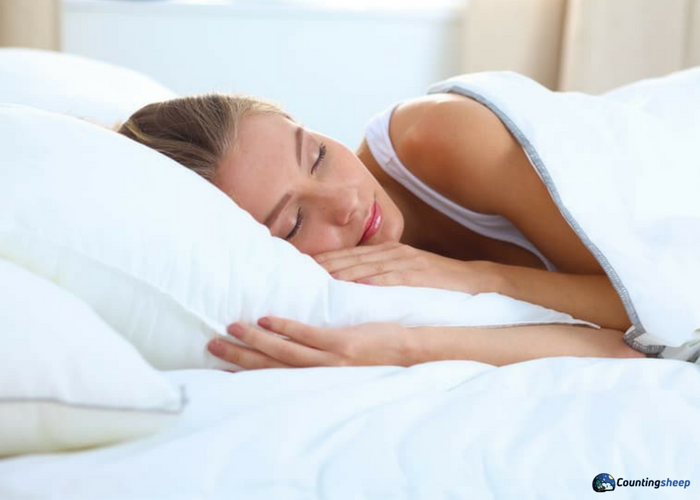
Feather Pillows
They have been around for a long time, and they are a very popular option because of their softness. Main advantages of these pillows are that they are quite soft and lightweight. They are also very durable, flexible, and hold shape. However, as any other type of pillows, this one also has its downsides. For example, they can sleep hot, and feather quills can poke out and cause irritation. The support is not excellent on these pillows, and they are not a suitable option if you are allergic to feathers.
Gel-Infused Pillows
These pillows are filled with a gel which keeps them cool, firm, and consistent. Thanks to the gel filling, you won’t have to worry about flattening. Some memory foam pillows also have a layer of gel around them that allows the proper cooling and fights heat retention. The primary advantage of gel pillows is their cooling feature. They are also hypo-allergenic and easy to care for. Additionally, they provide an excellent pressure relief. The only downside is that it may not be a perfect fit for all sleepers.
Contour Pillows
If you are a side sleeper, a contour pillow may be the right choice for you. They are a good option both for side and back sleepers, as the middle of these pillows curves down and provides solid support for your head. Thanks to them, you will be able to maintain proper posture during the night. Contour pillows can also help you with your snoring problem, as your airways will be kept open and allow smooth breathing. However, you shouldn’t choose them if you prefer sleeping on your stomach.
Whenever we find ourselves tossing and turning all night, it’s almost certain that our day will start off poorly. We begin to feel cranky, tense, and thoroughly exhausted. Based on the latest sleep statistics, 35.3% … Read more
Whenever we find ourselves tossing and turning all night, it’s almost certain that our day will start off poorly. We begin to feel cranky, tense, and thoroughly exhausted. Based on the latest sleep statistics, 35.3% of adults report getting less than 7 hours of sleep within a 24-hour period. Research also shows that around 37% of adults aged 20 to 39, and 40% of those aged 40 to 59, are not getting enough sleep. Despite the recommendations of health experts, over half of Americans think they’re getting sufficient sleep. Yet, more than 40% of the population believes they would feel better with more sleep.
59% of Americans currently spend around 6.8 hours sleeping, and that is way less than, for example 70 years ago, when 84% of Americans had an 8 hour sleep. That means that approximately 4 out of 10 Americans is not getting enough sleep. Are you among them?
Signs of Sleep Deprivation
If you continue missing out on the recommended 8 hours of sleep every night, you are jeopardizing both your physical and mental health. Sleep deprivation should be taken seriously because lack of sleep can completely drain our mental abilities and put our physical health at real risk. Sleep experts have linked sleep deprivation with various kinds of health problems, starting from weakened immunity, frequent mood changes, and memory issues to weight gain, high blood pressure and diabetes.
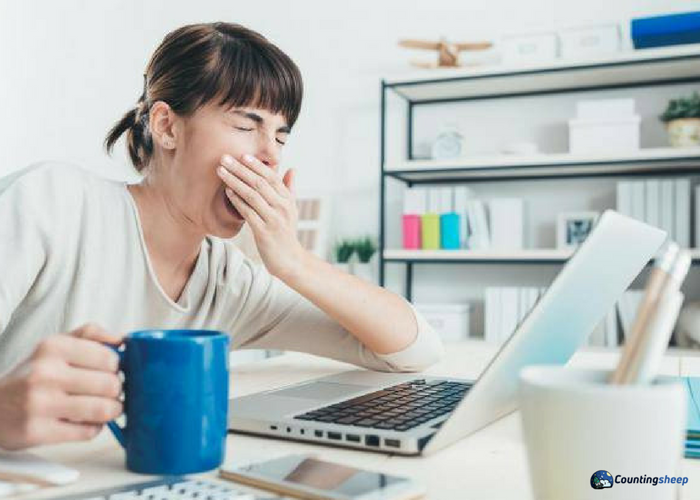
If you are constantly hungry, more impulsive than usual, and it seems like your emotions all over the place, think whether or not you have had enough sleep lately. If your motor skills are off, you are having troubles making decision, and you have memory issues, you definitely need to get more sleep. Apart from these signs, you may also experience weight gain, skin problems, and have troubles with your vision. As you can see, when you are sleep deprived, your entire body struggles. People who have less than 8 hours a sleep during a night also have a weaker immune system and often get sick.
How Sleep Deprivation Affects Your Body
Central nervous system: In case you are struggling with insomnia, your central nervous system will be the first one to react. In order to function normally and properly send information through your body, your central nervous system needs you to sleep. During sleep, new pathways are formed between neurons in your brain and those pathways are crucial for remembering new information you have learned during the day. If you don’t sleep, your brain will be exhausted and it won’t be able to form those pathways that help you remember what you have previously learned. Therefore, the first sign of sleep deprivation will be shown in lack of concentrating or learning, as well as memory issues. Since the information your body sends can come at a delay, your coordination and motor skills may be decreased or unstable.
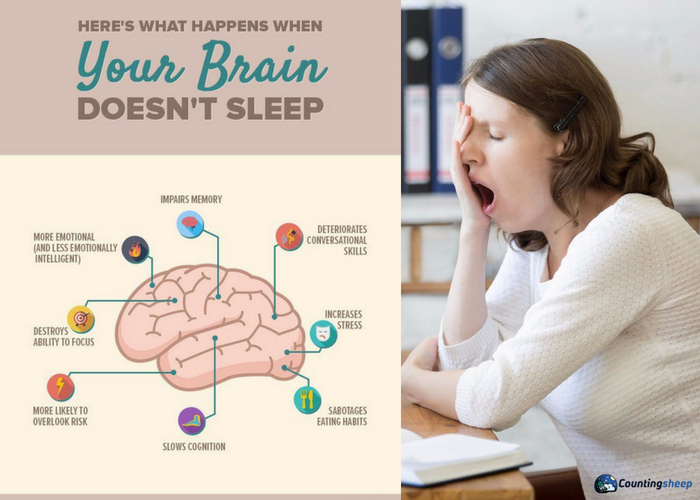
If sleep deprivation continues, your mental abilities will suffer and your emotional state will frequently change. You will suddenly become prone to mood swings and you may become impatient, impolite, impulsive and similar. In extreme cases, you might experience microsleep during the day. Microsleep means you have fallen asleep for a few seconds or minutes without realizing it. This is an alarming sign that your body really needs sleep, and that it needs it immediately. Micro sleep is very dangerous because it can lead to injuries and accidents, especially if you fall asleep while driving.
Immune system: your immune system requires sleep in order to restore itself and produce substances that will be ready to combat dangerous invaders such as viruses and bacteria. Getting enough sleep is crucial for defending your body against diseases. Without enough sleep, your immune system cannot build proper protection to fight off invaders. In severe cases of sleep deprivation, you increase risk for chronic illnesses such as diabetes and heart disease
Digestive system: Sleep affects the levels of two hormones that are vital for controlling the feelings of hunger and fullness. Those hormones are leptin and ghrelin. In case of sleep deprivation, these hormones will not be able to do their work properly. Instead, the levels of leptin will decrease, while the levels of ghrelin will increase, resulting in unnatural craving for snacks during night or overeating in the evening. Lastly, sleep deprivation also lead to releasing higher levels of insulin after a meal. Since insulin control your blood sugar level and promotes fat storage, you do not only risk gaining weight, but also diabetes.
Endocrine system: Never forget that hormone production primarily depends on your sleep. In order for your endocrine system to function normally, you need at least 6 hours of uninterrupted sleep. The time you go to bed is also very important because some hormones only produce during sleep and at particular hours of the night. For example, growth hormone, prolactin, and luteinizing hormone increase during sleep. Growth hormone is secreted in the first few hours of sleep, while other hormones are secreted during the first slow-wave sleep or deep sleep.
How to Sleep Better
Your body needs sleep as much as it needs food and air. So, if you have troubles sleeping at night, you should try optimizing your sleep. Getting a quality mattress, having sex before bed and sleeping with you partner are one of the things that could help you sleep better. Don’t allow sleep deprivation to lower the quality of your life and impact your physical and mental health. Optimize your sleep with the following tips:
- Get a new mattress – If you sleep on an old mattress, have in mind that it may be filled with mold, dust mite droppings, and other allergy triggers. Sleeping on a good mattress that is allergen-free and provide good support can help you deal with insomnia and sleep deprivation.
- Ensure the atmosphere in your bedroom is perfect for falling asleep – Power down any devices that may disturb your sleep such as phones, TV, computers etc. Set the temperature between 68 and 72 degrees.
- Train and set your inner body clock – establish a sleeping routine and stick to it. Go to sleep and wake up at roughly the same every day to help your body and brain create a healthy snooze-wake schedule.
- Eat and drink healthier – Avoid drinking too much coffee and consuming food and drinks with caffeine. Avoid eating fast food or having heavy meals for dinner.
- Cut down alcohol and tobacco consumption.
- Relax before you go to sleep – reading, meditating, listening to quiet music, or taking a warm bath should help you relax and fall asleep easier.
Choosing the right type of mattress for sleep is crucial, but so is selecting the appropriate size of the mattress. It’s essential to sleep on a mattress that provides good support, but it’s just as … Read more
Choosing the right type of mattress for sleep is crucial, but so is selecting the appropriate size of the mattress. It’s essential to sleep on a mattress that provides good support, but it’s just as important to ensure there’s enough room to sleep and relax comfortably. A frequent mistake made by many people when shopping for a new mattress is picking one that’s too small. To ensure you select the perfect mattress and enjoy uninterrupted sleep without feeling cramped, familiarizing yourself with the different mattress sizes on the market is key. Opting for the proper size mattress can also help reduce back pain and ensure you wake up each morning feeling rejuvenated and energetic.
When it comes to mattress size, consumers can usually choose between five main options – twin mattress size, full, queen, king and California king size mattress. There is also an option of making a custom size.
How to Choose the Right Mattress Size
Twin size: The length of each different mattress size is generally constant, but widths slightly differ. A twin mattress or a single mattress is the smallest size for adults. Twin mattress is approximately 38 inches wide and 75 inches long. It is not rare that they are short for some adults. A twin XL mattress comes with an extra 5 inches length to accommodate taller consumers.
Full Size Mattress
Full size or double size mattress is 75 inches long and 53 inches wide. If a couple share this bed, they will have only 27 inches of personal space which often isn’t enough space to sleep comfortably. Since the bed is 75 inches long, it may be short for some adults.
Queen-Size and King-Size Mattress
These mattresses measure 80 inches in length and 60 (queen) to 76 inches (king) in width. Although the queen size bed is only 5 inches wider, it makes a difference in comfort. This is the most popular mattress size for couples. This mattress is also an ideal fit for couples who have smaller bedrooms. However, if you are looking for maximum comfort and personal sleeping space, you should opt for a king-size mattress that gives you 38 inches of personal space – as each of you were sleeping in a twin bed.
California King Mattress
This mattress is around 72 inches wide and 84 inches long. If you have the budget and a large bedroom, why wouldn’t you treat yourself with a California king bed? However, before opting for such a big mattress, make sure you have measured your bedroom properly, and that you have purchased bedding that will properly match the large mattress. Also, have in mind that regular sheets and linen won’t fit adequately.
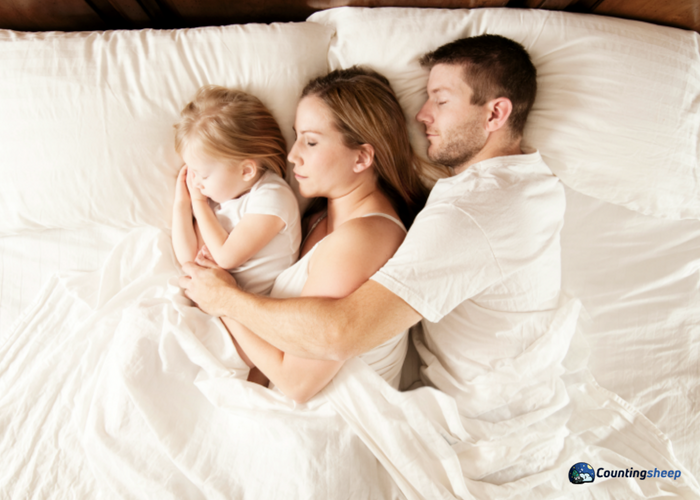
Due to the importance of sleep in general and, more specifically, the right type and size of mattress, it is necessary to explore all your options before making a purchase. Since there are so many different mattress sizes available, it may be hard for you to opt for the right size. A general guideline is to get a mattress size that is at least six inches longer than your height. The right mattress should be made of quality materials and provide you enough comfort to have a proper night of sleep.
Most of us spend a considerable amount of our lifetime in bed, asleep. Think about it: with an average of eight hours of sleep every night, one-third of our lives is spent in a state … Read more
Most of us spend a considerable amount of our lifetime in bed, asleep. Think about it: with an average of eight hours of sleep every night, one-third of our lives is spent in a state of slumber. Hence, it’s critical to reflect on the quality and type of mattress you use. Before rushing out to buy a new mattress, it’s wise to take a moment to understand the range of mattress varieties available on the market. Familiarizing yourself with the different types of mattresses will assist you in identifying the most suitable option for your needs. Mattresses differ based on their materials, construction, and specific features. Broadly, mattresses can be categorized into two main types: innerspring and specialty foam mattresses.
Sprung Mattresses
Sprung mattresses are the ones that have a spring system inside them. The more springs a mattress has, the better support it can provide to the sleeper. There are different types of sprung mattresses you can find on the market today, such as innerspring and pocket spring mattresses.
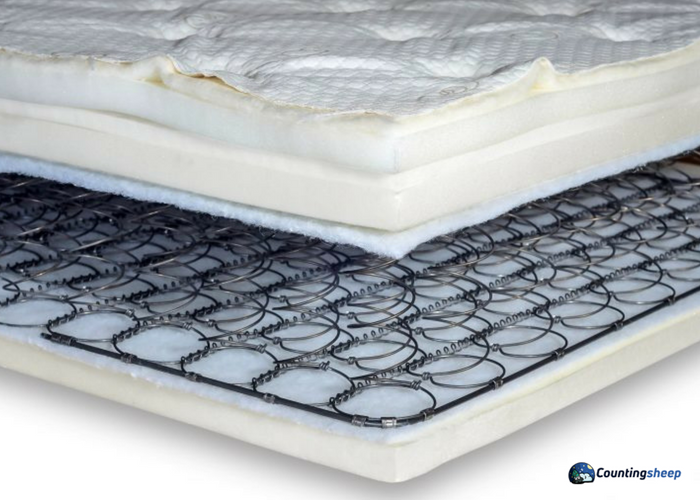
Innerspring mattress uses coil springs to provide excellent support to the sleeper. Usually, on top of the coils, there are also various upholsteries that provide additional support and comfort. Innerspring mattresses that used coil springs are very good, because they evenly distribute the body weight over the surface of the mattress. Innerspring mattresses are not popular as they were before, but many people still buy them because they are very familiar with them, and because they have used one before for many years.
Pocket spring mattresses are considered a more luxurious type of sprung mattress. This type of mattress has lighter springs that are wrapped using fabric pockets. Each spring works independently and constantly adjusts and conforms to the sleeper’s body shape. Due to this, pocket spring mattresses provide excellent support and great comfort to the person sleeping on them. It is perfect for light sleepers because it reduces the motion transfer and ensures they are not disturbed during their sleeping hours.
Specialty Foam Mattresses
Specialty foam mattresses can use one or more types of foam to create a perfect support system for the sleeper. The foam is combined and manufactured in different ways, shapes and densities in order to provide different levels of comfort and benefits to the consumers. Specialty foam mattresses can use polyurethane or memory foam, latex, gel and similar materials to properly meet various consumers’ needs.
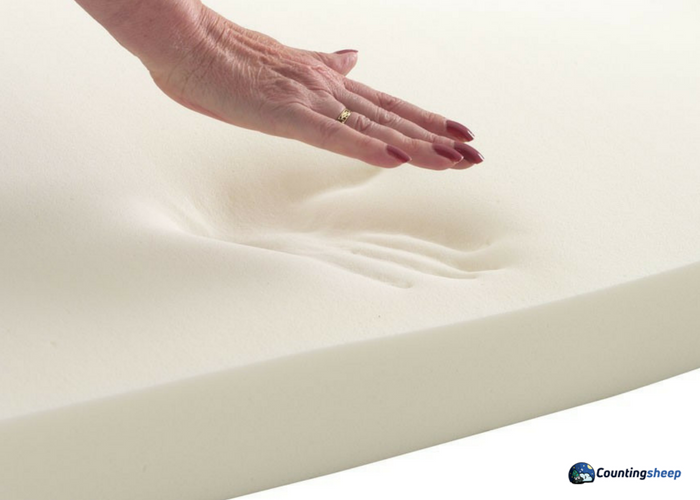
Memory foam is one of the most popular specialty foam mattresses on the market today. Memory foam is particularly popular because of its body contouring abilities, pressure relief and amazing support. When you are lying on a memory foam bed, it will slowly contour itself to the shape of your body rather than forcing you to adjust to it. These pressure-relieving benefits of memory foam can be very useful to sleepers who have problems with back pain and neck pain. Other types of foam such as latex and gel are durable and provide quality support to the consumer. However, latex and gel mattresses don’t conform to the body as much as memory foam does.
Your mattress is the biggest factor that impacts how well you sleep at night. If it’s more than seven years old and causes you pain and discomfort, it is time to replace it. Make sure you have thoroughly explored your options before deciding what type of mattress really feels good to your body and properly meets your needs and budget.
Undoubtedly, you have a favorite way to sleep, though perhaps you haven’t deeply considered why it matters. Your chosen sleep posture can say a lot about who you are, often more than you’d expect. While … Read more
Undoubtedly, you have a favorite way to sleep, though perhaps you haven’t deeply considered why it matters. Your chosen sleep posture can say a lot about who you are, often more than you’d expect. While it might not be immediately clear, there is a correlation between how you prefer to sleep and certain personality traits you might have. Essentially, your sleep patterns can offer a glimpse into your identity. Moreover, the position in which you sleep can have a significant impact on your well-being. Every sleeping position carries its own set of benefits and drawbacks and can potentially help or hinder your health conditions.
Here’s What Your Sleep Position Reveals about You
There are many ways to sleep comfortably, from lying spread across the entire bed to curling up into a ball. Every person has particular sleeping positions they favor the most. What you maybe don’t know is that a lot can be revealed about your personality based on sleeping positions meaning the way you sleep can reveal more about you than you even think. Here is what the way you sleep at night says about you:
The Fetal Position
Research shows that around 47% of Americans prefer sleeping in a fetal position. 54% of women consider sleeping curled up the best sleeping position, while only 34% of men adopt sleeping in the fetal position at night. This position, although it’s very common, reveals that you look strong on the outside, but that you are actually soft and sensitive on the inside. It can also indicate that you are shy when making new friendships, but that you also open up and relax quickly. People who sleep in a fetal position are also organized and conscientious.
The Yearner
The yearner sleeps on the side with arms stretched in front, as if he or she is trying to reach something. Not many Americans sleep in this position – only 13%. Sleeping in the yearner position doesn’t indicate that you are yearning for a good night sleep, but rather that you have a complex character. You are at the same time open-minded but cynical, confident in your conclusions but suspicious of your own decisions.
The Log
This position doesn’t look quite comfortable, but more than 6% of Americans sleep this way. If you want to try snoozing in this position just lie on your side with your arms straight. Side sleeping is a healthy sleeping position that can help you alleviate insomnia or other sleeping disorders. It can also help you alleviate back pain or hip pain. Sleeping like a log doesn’t indicate that you are a heavy sleeper, but rather that you are a bit of a social butterfly, very friendly and often carefree. You also have a very naïve nature and are very gullible to outsiders.
The Soldier
A soldier sleeps lying on his back and with arms straight by his sides. Sleep studies show that around 11% of the population prefers sleeping this way and consider this position very healthy as it brings them certain medical benefits. However, sleeping like a soldier can lead to lower back pain and even episodes of apnea. If you prefer sleeping this way, put a small pillow under your knees to relieve the tension from the lower back. And what does this position say about your personality? Sleeping like a soldier means you are quiet and reserved. It may also indicate that you adhere to discipline and strict moral codes and that you have high expectations for yourself.
The Freefall Position
If you love sleeping in this position, like the 17% of the American population does, you look like a relaxed skydiver that is free-falling through the sky. Most people preferring this position sleep on their stomach with their arms wrapped around their pillow.
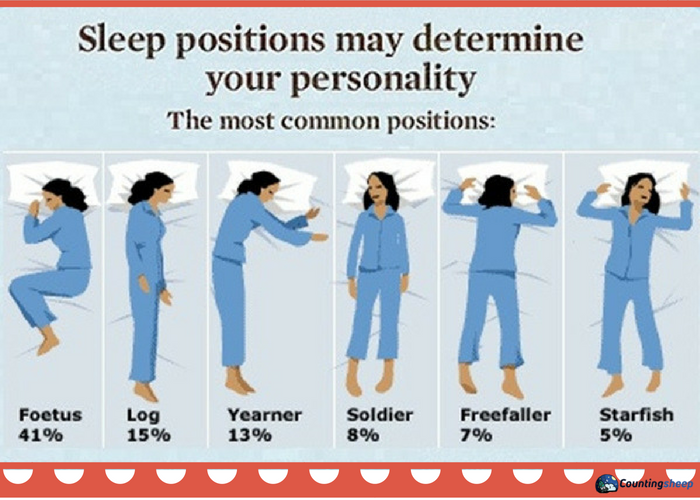
Despite being the second most popular sleeping position, about one-quarter (26%) of all Americans consider it the worst position. Although you find it comfortable, your body doesn’t. Freefaller sleeping position can lead to lower back strain and neck pain. To avoid frequent tossing and turning, as well as neck strains, you should sleep without a pillow or use only low and a very soft pillow. Sleeping on your stomach indicates that you are sociable and bold, but also rather sensitive when it comes to criticism. You have a playful and open personality, adventurous spirit and are a risk taker.
The Starfish Position
The starfish sleepers spread their arms and legs in a carefree manner over the entire bed. Only 7% of the population prefers sleeping this way. When it comes to your personality, it shows that you are a good friend, ready to help anyone that needs a hand. These people are rather introvert and don’t feel comfortable to be the center of attention.
The Stargazer
The stargazer sleeps lying on his back with his arms wrapped around his head – as if he is stargazing. This position indicates that you prioritize your friends and that you would do everything for the people you love.
The Pillow Hugger
As the name indicates, a pillow hugger sleeps with a pillow close to his body or with his limbs somehow wrapped around it. Pillow huggers are individuals who love to cuddle and get cozy. They nurture relationships with the people they love and care about and put them above everything else.
The Thinker
The thinker sleeps in the fetal position, but with his hand gently resting on his chin. Hm, what are they thinking about? The thinkers are considered more emotional than other sleepers and great lovers.
So, is the position that you sleep in an indicator of your personality or is it simply a preference? Whatever the way you sleep means, the most important thing is to focus on choosing fully comfortable positions that will help you get a good night’s sleep.
The Impact of Sleep Positions on Your Health
As you maybe already know, different sleep positions can have a different effect on your overall health. Of course, some of them are better than others. Your position preferences are related to your health and can have a positive or a negative impact on it.
- Sleeping on the Side. Some of the benefits of this style of sleeping include reduced acid reflux, the prevention of back pain and neck pain, and less snoring as airways are open. This sleep style also keeps the spine aligned. It is the best position for people with sleep apnea. However, the downside is that it can lead to wrinkles and it contributes to breast sag. When we sleep on the side, one side of our face is lying on a pillow, which can cause facial wrinkles. It can also contribute to breast sag as it causes breasts to lead downward. Fetal position can also prevent deep breathing as it can restrict diaphragm when curled up too tight. Additionally, it can aggravate arthritis, but you can prevent this by stretching out.
- Sleeping on the Stomach. It is the worst choice, and its only benefit is that it eases the snoring problems. However, it is terrible for everything else. For example, it can often result in the development of back pain and neck pain, aches, and numbness. It is also bad for breasts and can cause wrinkles. Stomach sleeping can also reduce the quality of sleep as people tend to shift positions a lot while sleeping as a result of their bodies trying to stay comfortable.
- Sleeping on Your Back. Although this position is not the most popular, it is the healthiest choice. It is excellent for preventing neck pain and back pain as there is no extra pressure on these areas, and it reduces acid reflux. It can also minimize wrinkles as there is no pushing your face against the pillow. The downside is that it is terrible for people who snore, and it can worsen obstructive sleep apnea.
What’s the Best Position for Your Health Problem?
As we already explained, the position that you are in when sleeping can have an impact on your health and well-being. A particular position can be excellent for one health issue and at the same time be terrible for a different health problem. If you need relief from pain, discomfort, and other problems, you should opt for healthy sleeping positions that will help you.
Best Position for Sleep Apnea
Every person has a preference when it comes to sleep positions. In most cases, people think nothing of it as it is their personal choice. However, it can have a vital impact on your quality of sleep, especially if you suffer from breathing abnormalities. If you suffer from sleep apnea, your airways are unrestricted while standing or sitting, but gravity works against them when you are in a horizontal position. This problem can be triggered when the blockage of your airways caused by relaxed muscles and surrounding tissue stops breathing altogether. If it happens often, you should reconsider your choice of sleep positions. The best position for sleep apnea is sleeping on the side as it keeps the airways open and stable, and they are less likely to collapse and cause breathing to stop. Sleeping on the side prevents sleep apnea and snoring while ensuring comfort.
Best Position for Neck Pain
We all know that it can be very unpleasant and uncomfortable to deal with neck pain all day. No matter if we are walking or sitting, this type of ache can be very persistent and irritable. If you often suffer from neck pain, and it seems to get even worse overnight, your preferred sleep position may be to blame. If you tend to wake up in pain, you should consider changing your sleep habits. The best sleeping position for neck pain is back sleeping. Sleeping on your back is the best option if you are dealing with neck pain as it keeps your neck properly aligned. On the other hand, the worst position for neck pain is stomach sleeping and you should avoid it at all cost.
Best Position for Back Pain
It is not easy to get through the day if you are dealing with back pain, and it can be even more difficult to get enough good night’s rest. In case you experience back pain on a regular basis, and can’t seem to get in and out of bed without it, changing your sleep habits can help you. If you sleep mostly on your stomach, you should stop doing it as it can worsen your problem. During the night, your core sinks deep into the mattress if you are resting on your stomach, while your head and limbs stay high up on the surface. Something like this can have a negative impact on your spinal alignment and contribute to back pain. The best position for back pain is back sleeping. This position keeps your spine, neck, and head in alignment, and helps prevent and relieve pain, which makes it the best sleeping position for lower back pain and upper back pain. You can increase your chances of getting enough quality rest by opting for back sleeping. It is also the best sleeping position for posture. If you want to be free of pain and have good posture, you should try resting on your back during the night, instead of on your stomach.
Best Position for Shoulder Pain
If you have shoulder pain, you shouldn’t sleep on that side of your body as leaning all of your weight into it will make the problem even worse. Finding the right sleep position can benefit you as it won’t agitate your shoulder. When it comes to the best position for shoulder pain, you can try side sleeping, but on the opposite shoulder. In case you want to sleep on your back, it is a wise idea to place a small pillow underneath the shoulder in pain. You should definitely avoid stomach sleeping as it will keep your shoulders unstable.
Best Position for Snoring During Pregnancy
No matter if you have snored before pregnancy or not, you should be aware that snoring during pregnancy is quite common and it affects about 30% of future moms. It is fairly common, and if you experience it regularly, it means that it would be the best idea to re-consider your position preferences. In most cases, this problem is caused by pregnancy hormones that contribute to nasal congestion, which is even worse when you lie down. The best position for snoring pregnant is side sleeping as it will keep your airways open. However, you should keep in mind that it is a better idea to sleep on your left side. It is the best side to sleep on when pregnant as it is a better option for blood circulation to your fetus. On the other hand, back sleeping can reduce blood flow to the fetus and you should definitely avoid it. Sleeping on the left side also prevents the uterus from pressing against the liver, which makes it the best position to sleep during pregnancy.
Quick Summary Limit evening fluid intake to reduce nighttime awakenings for bathroom visits. Avoid caffeine and alcohol several hours before bedtime, as they can disrupt sleep quality. Engage in regular exercise to promote faster sleep … Read more
Quick Summary
- Limit evening fluid intake to reduce nighttime awakenings for bathroom visits.
- Avoid caffeine and alcohol several hours before bedtime, as they can disrupt sleep quality.
- Engage in regular exercise to promote faster sleep onset and more restful sleep.
- Establish a consistent sleep schedule by going to bed and waking up at the same time daily, including weekends.
Research indicates that most Americans aren’t getting enough sleep. As a result, it comes as no surprise that numerous individuals feel irritated, worn out, and unable to face the day’s challenges. If you have a busy work life and believe that fitting in additional sleep is nearly impossible, the forthcoming suggestions will be beneficial in helping you secure the necessary amount of rest each night.
Keep in mind that healthy sleep habits are vital to your quality of life, and they can have a huge positive impact. In case you are sick of waking up in the middle of the night and being tired in the morning, you should do something about it. Getting better sleep is easier than you may think; you just need to follow some simple sleeping tips.
Limit Fluid Intake in the Evening
Most of us hate the feeling of waking up thirsty, and that’s why we drink water before we go to sleep. Although drinking water in the evening is beneficial, you shouldn’t overdo it. If you drink too much, you will wake up at night and have to go to the bathroom. These trips to the bathroom can have an adverse impact on your quality of sleep. Also, you shouldn’t drink fluids close to bedtime.
Avoid Caffeine and Alcohol
Many people drink coffee in the morning when they need help getting up. Most of us are used to having a cup of hot coffee early so that we can function properly during the rest of the day. Although it is an excellent idea for mornings, drinking coffee in the evenings is the worst thing that you can do if you have troubles getting enough sleep as it will keep you awake. You should avoid consuming caffeine for 4 to 6 hours before going to sleep. Besides coffee, caffeine can also be found in cola, tea, and chocolate. Alcohol can make you feel sleepy at first, but after few hours it will start acting as a stimulant and decrease your quality of sleep during the night. Avoid consuming it 3 to 4 hours before the bedtime.
Eat Light Meals
It is not a good idea to have a heavy meal in the evening as it can cause discomfort. If you plan to have a big or spicy dinner, you should do it at least 3 hours before you go to sleep. In case you start getting hungry afterward, you can eat a light snack an hour before the bedtime. Don’t worry, it won’t disturb your sleep.
Exercise
Exercising is not only healthy for our bodies, but for our minds as well. If you exercise regularly, you shouldn’t have troubles sleeping at night. People with active lifestyle fall asleep faster and wake up early refreshed and well-rested. In case you wake up tired, it would be good to exercise a few hours before going to bed. If you do it, you will sleep more soundly, and wake up full of energy in the morning.
Establish a Sleeping Routine
In case you have troubles sleeping, it would be of great help to have a sleep schedule. It means that you should try to go to bed and wake up at roughly the same time every day. It works in a way that it regulates your body’s clock, and thanks to it, you won’t have to worry about restless nights. Try to stick to this routine on weekends too.
Avoid Naps
Some people need to take a short nap during the day to avoid feeling tired. Although this habit can help you get through the day, it can have an adverse impact on your sleeping at night. Sometimes, when a person takes a nap in the afternoon, he or she can’t fall asleep at bedtime. If this is the case, you should try to get through the day without a nap. However, if it is not possible, you should at least limit it to 30 minutes.
Get a Comfortable Mattress
If your current mattress is not as supportive and comfortable as it should be, you should consider getting a new one. The lack of comfort and support often occurs when a mattress has exceeded its lifespan. Comfortable pillows can also improve your quality of sleep and enhance the beauty of your bedroom. It is a win-win situation.
Go to Sleep When Tired
Sometimes, people go to bed even if they are not truly tired because they want to get their 8 hours of sleep before the morning. However, you can’t force something like this if you don’t feel tired. In case you go to bed, and you are not asleep after half an hour, it would be a good idea to go to another room, do something that will relax you, and as soon as you start feeling tired, return to bed.
Tossing and turning all night because of back pain is a nightmare! Time to ditch that ancient mattress and welcome a brand-spanking-new one. Oh, the joy of picking out a fresh mattress! The wait might … Read more
Tossing and turning all night because of back pain is a nightmare! Time to ditch that ancient mattress and welcome a brand-spanking-new one. Oh, the joy of picking out a fresh mattress! The wait might seem endless, but it’s totally worth it. Now, the real puzzle: what in the world do you do with the old one? If it’s been your dream partner for eons, it’s served its purpose. **Old mattresses are gigantic**, turning your space into a hot mess if you don’t get rid of them properly. For anyone wanting a tidier space without breaking a sweat, figuring out how to properly say goodbye to an old mattress is key. And guess what? Once you nail down how to kick that clunky mattress to the curb, your place will feel amazingly roomy. Hang tight, because you’re about to learn the ins and outs of making mattress removal easy-peasy, making room for more awesome stuff in your life!
The first thing that comes to mind is to leave it on the side of the road and wait until it is taken to the dump. However, this is a wrong solution, especially if you consider the fact that the landfills are already full of old mattresses. Each year, more than 20 million mattresses end up in landfills. Not only they are large and heavy, but they also can create dangerous conditions for workers. You should be aware that their shapes can create flammable air pockets. If you don’t want to put the well-being of landfill workers at risk, you should come up with a different way of disposal.
Donation
In case your mattress doesn’t show signs of wear and tear, and it is less than five years old, you should consider donating it. If it is not suitable to you, it may be of use to someone else. You have a variety of options to choose from when it comes to donating. For example, you can ask your friends and relatives if they need a mattress, or you can donate it to charity or the Salvation Army. Many organizations look forward to accepting mattress donations. However, if the lifespan of your mattress has expired, and it shows signs of wear, you shouldn’t donate it. Its weight can double in just a decade due to the collection of dead skin, body sweat, and dust mites, and in this case, you should think of a different way of disposal.

Recycling
Recycling is an eco-friendly way of disposal, and it is a great option as most materials inside the mattress are considered recyclable. Some of them include foam, wood, metal springs, and cotton. If you choose this option, you will not only get rid of the old mattress, but you will also help protect the environment. In case your mattress is not suitable for donation, and it is very old, you should contact one of the recycling centers in your area and dispose of it in a proper way.
Throwing Away
If the previous two options are unsuitable, you should consider throwing your old mattress away. People usually choose this solution if there is no recycling center in their area. However, getting rid of it is not as easy as leaving it at the side of the road. Most municipal trash collectors won’t accept it because of the weight, as well as the variety of materials that it is made with. If this is the case, you should get in touch with a local sanitation department or contact a dumpster rental company.
According to a new study, persistent severe sleep problems in infants can be linked with prepartum and postpartum mental and physical health of mothers.
Few things are as crucial as sleep for a newborn. On average, infants dedicate 16 hours daily to sleep, which is vital for their physical and mental growth. Therefore, any sleep issues in the initial stages of life must be addressed immediately.
It is vital to learn what is causing these sleep disturbances. And according to a new study by the Murdoch Children’s Research Hospital, persistent severe problems in babies can be linked to poor maternal prepartum and postpartum physical and mental health.
A team of researchers led by Dr. Fallon Cook followed 1460 women at 15 weeks gestation, and when their babies were 3, 6, 9, and 12 months old.
Experiencing sleep problems during the first year is common, and based on the results of their research, the team divided infant sleep problems into five categories:
- Those who had a few issues (24.7%)
- Persistent moderate problems (27.3%)
- Increased problems at 6 months (10.8%)
- Increased problems at 9 months (17.8%)
- Persistent severe issues (19.4%)
Persistent severe sleep problems in infants were correlated with mental health in mothers during pregnancy and after childbirth. Infants with the mothers who had prepartum and postpartum feelings of anxiety and depression, lower overall perception of health, as well as increased intimate partner violence (IPV) during the first year after birth, were much more likely to have persistent sleep impairments
These findings suggest that there are more things affecting infant sleep than parenting style, with mothers’ well-being during and after pregnancy being one of the most significant factors.
According to the authors, these results are significant as they could be used to predict sleep problems in babies and possibly intervene before they occur. Additionally, parents of infants with sleep problems often fell exhausted, depressed, and anxious and have feelings of self-doubt when it comes to parenting.
And what these findings say is that some infants may be predisposed to sleep problems because of the impaired prepartum maternal mental health, despite how hard parents try to help their newborns sleep.
What we should focus on is identifying and addressing the mental and physical health of women during pregnancy and after childbirth. Parents should seek professional help from their GPs or child health nurse if they are feeling anxious, depressed, and fatigued. Reaching out to family, friends, and local parenting groups can also help.
Being a new parent is stressful enough without infant sleep problems, but when they occur, it can become unbearable. It is crucial to address these issues as soon as they present themselves and take care of your mental and physical health. You can check our science-based sleep tips for babies, for more info on tackling sleep problems in infants.
Disturbed sleep has a huge effect on mood, emotional state, and daytime functioning. This study researches the impact of poor sleep at an early stage.
At a young age, sleep ranks among the crucial necessities. It plays a key role in both physical and mental growth, alongside contributing significantly to emotional health. If you’re under the impression that issues like depression, anxiety, and behavioral challenges are exclusive to adults, you’re greatly mistaken.
An increase in the prevalence of these conditions in children shows that the situation is very serious, and we might have to look for triggers at the early stage of development.
A new study from the University of Birmingham investigates a link between sleep problems at an early age, and how they affect later emotional development. The results show that infants with poor sleep quality have a higher chance of developing depression, anxiety, or behavioral problems as toddlers.
Although it is well known how sleep disturbances can impact mood, irritability, and behavioral difficulties during the daytime, this study investigates how poor sleep affects behavioral and emotional health later in childhood.
Researchers from the University of Birmingham collaborated with the Finnish Institute for Health and Welfare to find out the impact of night awakenings, prolonged period of falling asleep, and short sleep duration on emotional state and behavioral problems in toddlers at 24 months.
The team used the results from sleep questionnaires from a study where parents reported sleep quality of their children at 3, 8, 18, and 24 months. They gathered the information from almost 1700 parents. Later, those results were compared with an additional questionnaire on emotional and behavioral state at 24 months, filled by 950 parents.
The results showed frequent night awakenings at three months of age to be strongly linked to the inability to control emotions and behavior, and overall emotional problems in toddlers. Additionally, both short sleep and longer sleep onset were correlated to behavioral problems at 24 months, such as temper tantrums.

According to these findings, it is easy to conclude the enormous importance of sleep quality on mental health and the development of healthy coping mechanisms at a later age. These sleep disturbances could have different origins, form genetics to environmental factors. Of course, detecting poor sleep at a young age is vital for healthy development.
Authors highlight the importance of more research in this area, as well as developing novel interventions for infants with sleep problems, as it could be particularly beneficial for healthy emotional state and behavioral control in children.
A new study from UC Berkley highlights the importance of deep sleep in dealing with stress and anxiety. It is essential for both prevention and recovery.
Stress pops up like a sneaky cat, hiding around every corner of our daily lives. Try as you might, you just can’t shake it off completely. Getting the hang of taming stress and anxiety is super important for keeping your health in tip-top shape. If you’re keen on knocking stress down a peg or two, stick around. You’re about to discover some neat tricks that’ll help keep your cool, making a huge difference in your well-being!
According to a new study from the University of California, Berkley, sleep is an effective way to get your emotions in order. In fact, they claim that losing a night of sleep can lead to a 30% rise in anxiety levels the following day.
We all know that sleep is vital for our well-being, as lack of proper rest often leaves us irritable, prone to mood swings, and unable to concentrate or perform mentally. And according to UC Berkley researchers, a specific phase of sleep is responsible for resetting our anxious brains.
When we fall asleep, we experience a couple of light sleep phases at the beginning, following by deep sleep, and then finally rapid eye movement (REM) stage. It seems that deep sleep is particularly important for reducing stress and anxiety, as neural oscillations are deeply synchronized, and blood pressure and heart rate drop. That gives a perfect opportunity to reorganize connections in the brain and repair damage.
Study authors point that sleep is a natural remedy for anxiety disorders that are on the rise in the US, with over 40 million Americans suffering from them. What’s concerning is that we see a trend of prevalence increase in children and teens. But when you account for the fact that most children and teenagers aren’t getting enough sleep regularly, it all makes sense.
Using a series of experiments, researchers from UC Barkley scanned the brains of 18 young adults, while they watched disturbing video clips. The investigators wanted to see if there was any difference if the participants viewed stirring videos after a sleepless or a night full of sleep. They used polysomnography and functional MRI for measuring brain and other activity, and each session was followed by a questionnaire to assess the level of anxiety in participants.
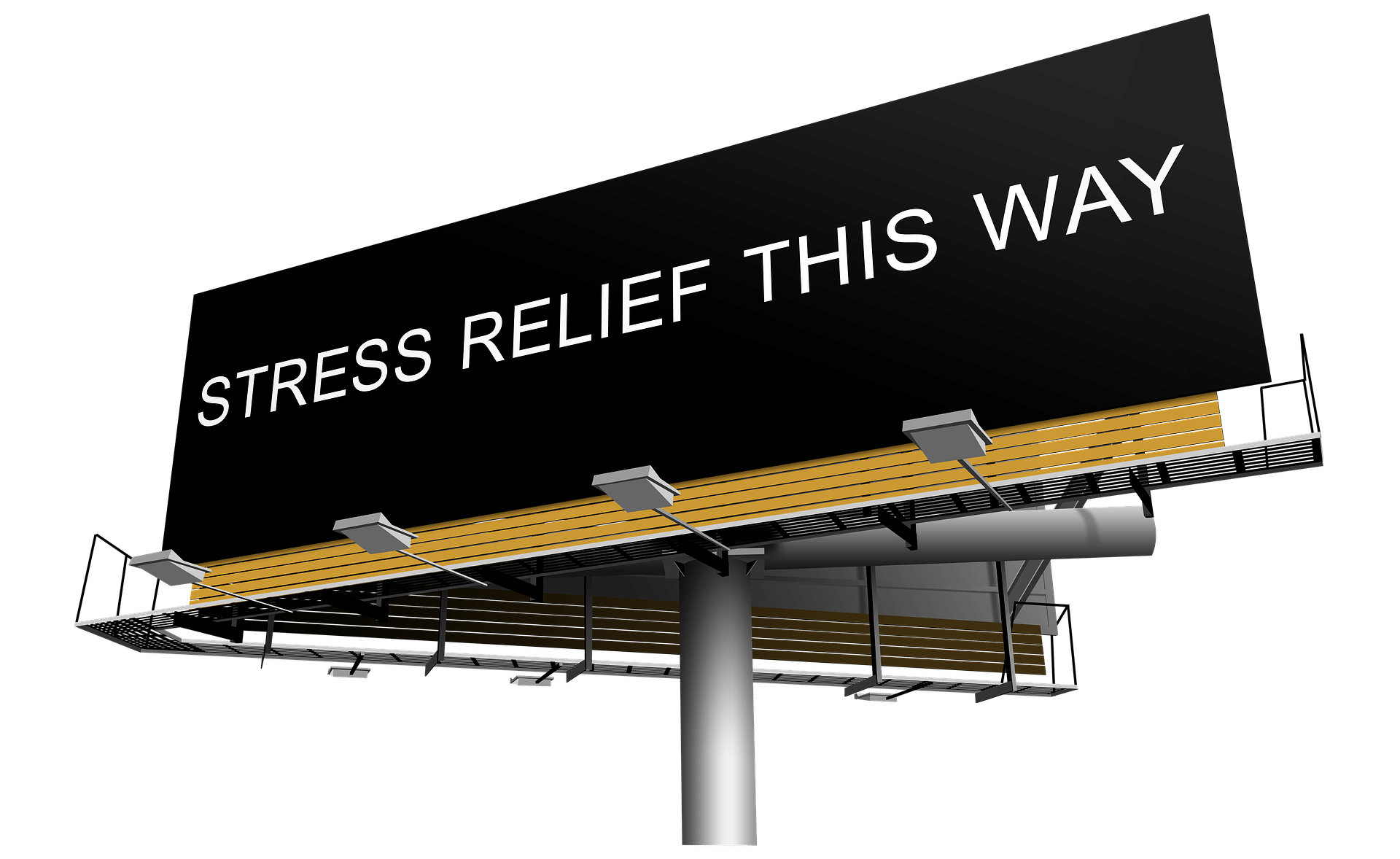
As expected, subjects who slept less had an increased anxiety response to viewing those disturbing videos. Brain scans showed complete inhibition of the prefrontal cortex, which generally keeps stress and anxiety in check. Additionally, emotional centers in the brain were overactive.
More importantly, after a night full of sleep, anxiety levels dropped significantly. And there was a positive correlation with deep sleep, meaning that participants who experienced more deep sleep had lower anxiety levels.
These findings show that deep sleep is essential for both the prevention and mediation of stress and anxiety.
Researchers managed to replicate their results in another similar study with 30 participants, where participants who got the most deep sleep also experienced the lowest anxiety levels the following day.
Additionally, researchers conducted an online study following 280 subjects for four days and tracking their anxiety levels. The results were similar to previous studies. But interestingly, even the slightest changes in deep sleep affected the anxiety levels.
All these findings support the argument that sleep recommendations should be a part of managing anxiety disorders. More importantly, sleep could be an excellent natural prevention for developing these conditions in the first place.